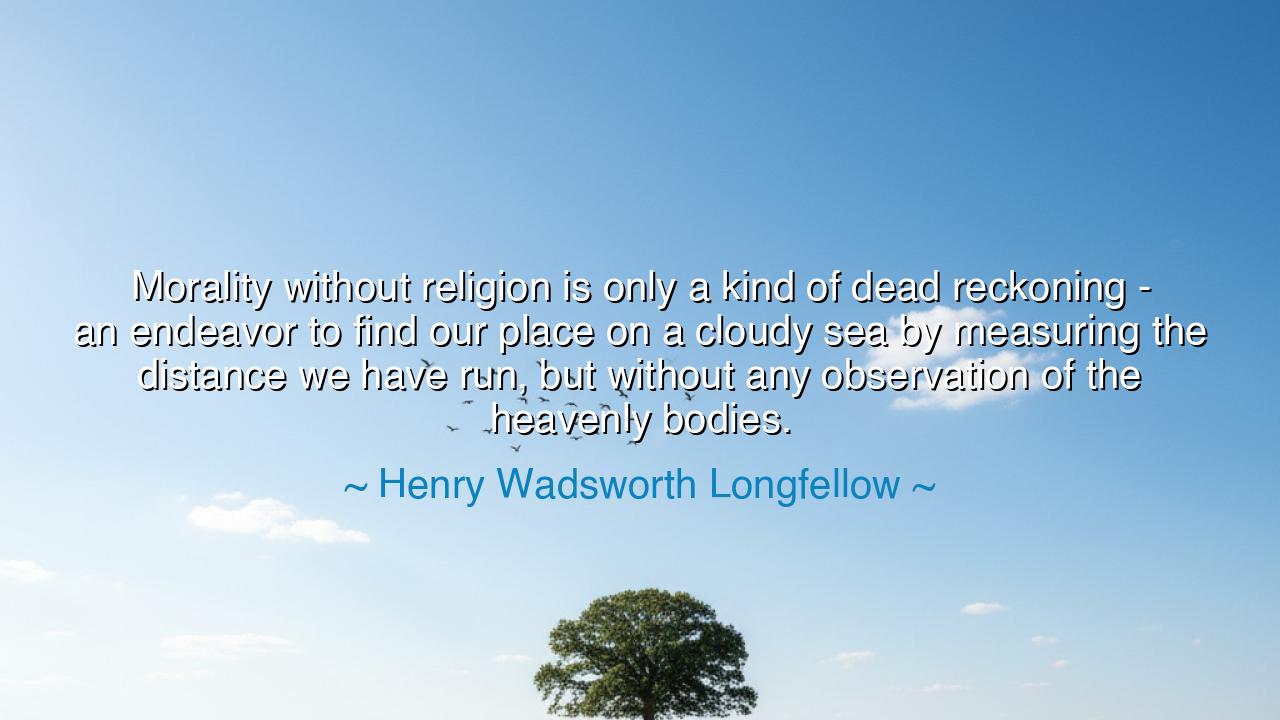
Morality without religion is only a kind of dead reckoning - an
Morality without religion is only a kind of dead reckoning - an endeavor to find our place on a cloudy sea by measuring the distance we have run, but without any observation of the heavenly bodies.






Hear, O children of wisdom, the voice of Henry Wadsworth Longfellow, poet of the American soul, who declared: “Morality without religion is only a kind of dead reckoning—an endeavor to find our place on a cloudy sea by measuring the distance we have run, but without any observation of the heavenly bodies.” In this image he calls us to consider the frailty of human judgment when it is divorced from the divine. For morality without higher guidance may chart a course for a time, but it risks drifting aimlessly, like a ship lost at sea, unable to fix its position against the eternal stars.
The origin of this thought rests in Longfellow’s age, when the rise of science, rationalism, and modern philosophy began to question the authority of religion as the anchor of morality. Longfellow, himself a man of faith and imagination, saw that reason alone—though useful—was not sufficient to guide the human soul. He likened it to dead reckoning, the sailor’s practice of estimating his position by distance and direction, without sight of sun or stars. Such navigation may suffice for short journeys, but over time it leads to error, drift, and disaster. Only by consulting the heavenly bodies—symbols of divine truth—can a ship hold its true course.
History bears witness to this warning. Consider the French Revolution, which began with noble ideals of liberty, equality, and fraternity. Yet when it sought to erase religion and enthrone Reason alone as goddess, it soon descended into terror, bloodshed, and tyranny. Without the compass of higher vision, morality faltered, and the nation’s course veered into darkness. Longfellow’s metaphor shines here: without the stars of faith, the revolutionaries could not find their way through the storm.
The ancients, too, understood this balance. The Greeks honored not only reason but the gods, seeking harmony between human wisdom and divine order. The Hebrews, guided by their covenant with heaven, found in the Law a star to direct their moral journey. Even Rome, pragmatic and worldly, tied its civic virtues to reverence for the gods, believing that to abandon piety was to invite chaos. In every age, those who sailed without stars found themselves wrecked upon hidden reefs.
The meaning of Longfellow’s words is not to deny the value of human morality, but to declare that without transcendence, morality is incomplete. Human reason can measure deeds, can weigh justice, can approximate right and wrong, but it lacks an unchanging reference point. Religion—when true and pure—lifts the eyes to something eternal, a light beyond shifting tides, a star that does not move. It is this higher vision that prevents morality from becoming mere convenience or calculation.
The lesson for us, O listeners, is profound: seek your stars. Do not trust only in the wisdom of men, for it is clouded by pride, by self-interest, by the illusions of the moment. Look also to the eternal truths that shine above—compassion, justice, reverence, humility—truths revealed through religion, through the wisdom of prophets, poets, and saints. Without such guidance, we may find ourselves adrift, boasting of progress while slowly veering into peril.
Practical actions stand before you: Reflect not only on what seems right in the moment, but on what aligns with eternal principles. In times of doubt, lift your thoughts beyond yourself, asking what the stars of faith and conscience reveal. Study sacred teachings, not as chains but as compasses. And in your dealings with others, remember that morality grounded only in calculation may falter, but morality illuminated by reverence will endure.
Thus, remember the teaching of Henry Wadsworth Longfellow: morality without religion is dead reckoning. Do not sail blind on cloudy seas, measuring only by your own steps. Lift your eyes to the heavens, to the enduring stars of truth, and let them guide you across the stormy oceans of life. For ships guided by the stars may still battle waves and wind, but they shall not lose their way.






AAdministratorAdministrator
Welcome, honored guests. Please leave a comment, we will respond soon